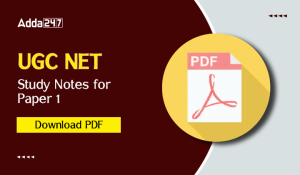Table of Contents
Naturalism and Education both makes child learn about the philosophy of naturalism from an educational point of view. As per Rusk’s views, “Naturalism is a philosophical position adopted by those who approach philosophy from a purely scientific point of view.” So we need to more learn about Naturalism and Education – Aims, Curriculum, Teaching Methods and Discipline. This topic can be significant ones from the CTET perspective.
NATURALISM AND EDUCATION / प्रकृतिवाद और शिक्षा
Naturalism is also termed as materialism. According to this philosophy, the basis of the world is matter. Mind is also a form of matter or an element of matter or a synthesis of both. Naturalism philosophy defines life in terms of material and chemical laws and emphasized the relationship between power, speed, and matter as of the nature of the causal relationship
प्रकृतिवाद और शिक्षा
प्रकृतिवाद को भौतिकवाद भी कहा जाता है। इस दर्शन के अनुसार जगत् का आधार पदार्थ है। मन भी पदार्थ का एक रूप है या पदार्थ का एक तत्व या दोनों का संश्लेषण है। प्रकृतिवाद दर्शन जीवन को भौतिक और रासायनिक नियमों के संदर्भ में परिभाषित करता है और कारण संबंध की प्रकृति के रूप में शक्ति, गति और पदार्थ के बीच संबंध पर जोर देता है।
Principles (chief assertions) of Naturalism.
Following are the chief assertions of naturalism :
- A universe is a huge machine. Man is also a part of this machine and a complete machine in himself also.
- Life comes out of dead matter and is a sum total of physical and chemical reactions.
- All the capacities of an individual human being are delimited by his nature. Those are his innate and inherent tendencies and basic instincts.
- Man is the supreme creation of nature.
- The present life is real life.
- Unchanging laws of nature explain all the events and occurrences of the world.
- The true explanation of reality can only be done in terms of physical science.
- Thoughts depend on physical circumstances. They are activated only when some external stimuli affect the body organ of an individual.
प्रकृतिवाद के सिद्धांत (मुख्य अभिकथन)
प्रकृतिवाद के प्रमुख दावे निम्नलिखित हैं::
- ब्रह्मांड एक बहुत बड़ी मशीन है। मनुष्य भी इस मशीन का एक हिस्सा है और अपने आप में एक पूरी मशीन भी।
- जीवन मृत पदार्थ से निकलता है और भौतिक और रासायनिक प्रतिक्रियाओं का कुल योग है।
- एक व्यक्ति की सभी क्षमताएं उसके स्वभाव से सीमित होती हैं। ये उसकी सहज और अंतर्निहित प्रवृत्तियाँ और मूल प्रवृत्तियाँ हैं।
- मनुष्य प्रकृति की सर्वोच्च रचना है।
- वर्तमान जीवन ही वास्तविक जीवन है।
- प्रकृति के अपरिवर्तनीय नियम दुनिया की सभी घटनाओं और घटनाओं की व्याख्या करते हैं।
- वास्तविकता की सही व्याख्या भौतिक विज्ञान के संदर्भ में ही की जा सकती है।
- विचार भौतिक परिस्थितियों पर निर्भर करते हैं। वे तभी सक्रिय होते हैं जब कुछ बाहरी उत्तेजनाएं किसी व्यक्ति के शरीर के अंग को प्रभावित करती हैं.
Aims of Education
- To perfect the human-machine. The first aim of education is to make the individual work very efficiently as a part of the huge machine; the universe and also works as a very efficient machine himself.
- Attainment of present and future happiness. Biological naturalism advocates the attainment of happiness in the present life as well as in the life to come.
- Preparation for the struggle of existence. Education should develop the capacities of the individual so that he comes out victorious in the struggle of life and existence in this world.
- Adaptation to the environment. The aim of education should be to strengthen the capacity of adaptation of the individual. Reinforcement by education will give the individual added capacity and efficiency to this task of adaptation.
- Improvement of racial gains. Some naturalists believe that the racial heritage of cultural and civilizational achievements cannot be transferred from generation to generation by a merely natural process of inheritance. As such, education should conserve and preserve this cultural heritage and develop it further.
- Natural development. Education should develop the child according to his inborn tendencies, interests, inclinations, aptitudes, and capacities in a free environment.
- Autonomous development. The development of an individual is to be free, fully autonomous, and self-acquired.
शिक्षा के उद्देश्य.
- मानव मशीन को परिपूर्ण करने के लिए- शिक्षा का पहला उद्देश्य व्यक्ति के काम को बड़ी मशीन के हिस्से के रूप में बहुत कुशलता से बनाना है; ब्रह्मांड और स्वयं एक बहुत ही कुशल मशीन के रूप में भी काम करते हैं।
- वर्तमान और भविष्य के सुख की प्राप्ति- जैविक प्रकृतिवाद वर्तमान जीवन के साथ-साथ आने वाले जीवन में भी सुख की प्राप्ति की वकालत करता है।
- अस्तित्व के संघर्ष की तैयारी- शिक्षा को व्यक्ति की क्षमताओं का विकास करना चाहिए ताकि वह इस दुनिया में जीवन और अस्तित्व के संघर्ष में विजयी हो सके।
- पर्यावरण के लिए अनुकूलन- शिक्षा का उद्देश्य व्यक्ति के अनुकूलन की क्षमता को मजबूत करना होना चाहिए। शिक्षा द्वारा सुदृढ़ीकरण अनुकूलन के इस कार्य के लिए व्यक्ति को अतिरिक्त क्षमता और दक्षता प्रदान करेगा।
- नस्लीय लाभ में सुधार – कुछ प्रकृतिवादियों का मानना है कि सांस्कृतिक और सभ्यतागत उपलब्धियों की नस्लीय विरासत को केवल विरासत की एक प्राकृतिक प्रक्रिया द्वारा पीढ़ी से पीढ़ी तक स्थानांतरित नहीं किया जा सकता है। अत: शिक्षा को चाहिए कि वह इस सांस्कृतिक विरासत का संरक्षण एवं परिरक्षण करे तथा इसे और विकसित करे।
- प्राकृतिक विकास- शिक्षा को मुक्त वातावरण में बच्चे को उसकी जन्मजात प्रवृत्तियों, रुचियों, झुकावों, योग्यताओं और क्षमताओं के अनुसार विकसित करना चाहिए।
- स्वायत्त विकास- व्यक्ति का विकास स्वतंत्र, पूर्ण स्वायत्त और स्व-अर्जित होना है.
CURRICULUM: –
The curriculum should consist of subjects and items which reflect the inborn tendencies, natural interests, natural activities, individual differences, and sex problems of children. The curriculum should contain :
a. Games
b. Sports.
c. Physical culture.
d. Biology
e. Physics.
f. Nature study.
g. Language.
h. History
i. Geography and other allied subjects
पाठ्यचर्या : –
पाठ्यचर्या में ऐसे विषय और विषय शामिल होने चाहिए जो बच्चों की जन्मजात प्रवृत्तियों, प्राकृतिक रुचियों, प्राकृतिक गतिविधियों, व्यक्तिगत अंतर और यौन समस्याओं को दर्शाते हों। पाठ्यचर्या में शामिल होना चाहिए:
- खेल।
- खेल।
- भौतिक संस्कृति।
- जीवविज्ञान
- भौतिक विज्ञान।
- प्रकृति अध्ययन।
- भाषा: हिन्दी।
- इतिहास
- भूगोल और अन्य संबद्ध विषय.
METHODS OF TEACHING: –
Naturalism prescribed :
- Learning by doing.
- Learning by experience, and
- Learning by play is the basis of teaching.
The principles advocated by naturalists have brought into being the modern methods of teaching which are :
- Observation method.
- Play-way method.
- Heuristic method.
- Dalton plan.
- Montessori Method and other such methods.
- Experimental methods.
All these methods are self-learning methods and as such, they are very effective and purposeful.
शिक्षण की विधि : –
प्रकृतिवाद निर्धारित:
- करके सीखना
- अनुभव से सीखना, और
- खेल के माध्यम से शिक्षण के आधार के रूप में सीखना.
प्रकृतिवादियों द्वारा समर्थित सिद्धांतों ने शिक्षण के आधुनिक तरीकों को जन्म दिया है जो इस प्रकार हैं:
- अवलोकन विधि।
- प्ले-वे विधि।
- अनुमानी विधि।
- डाल्टन योजना।
- मोंटेसरी विधि और ऐसी अन्य विधियाँ।
- प्रायोगिक तरीके।
ये सभी विधियाँ स्व-शिक्षण विधियाँ हैं और इस प्रकार ये बहुत प्रभावी और उद्देश्यपूर्ण हैं।
NATURALISM AND TEACHER: –
Nature is the only supreme teacher, in whose close contact the child develops normally and naturally. In the process of education, the place of the child is more important and central than the teacher. The teacher is only to set the stage and allow the child to act freely according to his inherent capacities and the teacher is only to act as a sympathetic observer and guide.
प्रकृतिवाद और शिक्षक: –
प्रकृति ही एकमात्र सर्वोच्च शिक्षक है, जिसके निकट संपर्क में बच्चा सामान्य और स्वाभाविक रूप से विकसित होता है। शिक्षा की प्रक्रिया में बच्चे का स्थान शिक्षक से अधिक महत्वपूर्ण और केंद्रीय होता है। शिक्षक केवल मंच निर्धारित करने के लिए है और बच्चे को उसकी अंतर्निहित क्षमताओं के अनुसार स्वतंत्र रूप से कार्य करने की अनुमति देता है और शिक्षक केवल सहानुभूति पर्यवेक्षक और मार्गदर्शक के रूप में कार्य करता है.
DISCIPLINE:
In the field of discipline also, naturalists depend upon nature and advocate the theory of ‘discipline by natural consequences.’ According to them, nature will punish the child if he contravenes the law of nature and thus he will learn by the consequences of his own actions.
अनुशासन: –
अनुशासन के क्षेत्र में भी, प्रकृतिवादी प्रकृति पर निर्भर हैं और “प्राकृतिक परिणामों द्वारा अनुशासन” के सिद्धांत की वकालत करते हैं। उनके अनुसार, प्रकृति के नियमों का उल्लंघन करने पर बच्चे को प्रकृति दंडित करेगी और इस प्रकार वह अपने कार्यों के परिणामों से सीखेगा।
Download Naturalism and Education PDF




 UGC NET Study Notes for Paper 1, Downloa...
UGC NET Study Notes for Paper 1, Downloa...
 GSET Teaching Aptitude Questions and Ans...
GSET Teaching Aptitude Questions and Ans...
 समुद्र का पर्य�...
समुद्र का पर्य�...












